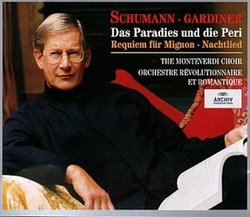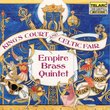| All Artists: Robert Schumann, John Eliot Gardiner, Barbara Bonney, Bernarda Fink, Orchestre Revolutionnaire et Romantique, The Monteverdi Choir, Alexandra Coku, Christoph Prégardien, Neill Archer, Gerald Finley, Cornelius Hauptmann, William Dazeley, Hanover Boy's Choir Title: Robert Schumann: Das Paradies und die Peri / Requiem für Mignon / Nachtlied - The Monteverdi Choir / Orchestre Révolutionnaire et Romantique / John Eliot Gardiner Members Wishing: 0 Total Copies: 0 Label: Archiv Prod Import Release Date: 5/26/1999 Album Type: Import Genres: Pop, Classical Styles: Vocal Pop, Opera & Classical Vocal, Symphonies Number of Discs: 2 SwapaCD Credits: 2 UPC: 028945766027 |
Search - Robert Schumann, John Eliot Gardiner, Barbara Bonney :: Robert Schumann: Das Paradies und die Peri / Requiem für Mignon / Nachtlied - The Monteverdi Choir / Orchestre Révolutionnaire et Romantique / John Eliot Gardiner
 | Robert Schumann, John Eliot Gardiner, Barbara Bonney Robert Schumann: Das Paradies und die Peri / Requiem für Mignon / Nachtlied - The Monteverdi Choir / Orchestre Révolutionnaire et Romantique / John Eliot Gardiner Genres: Pop, Classical
This lovely, unjustly neglected work should have become part of the mainstream repertoire long ago. Based on a Persian legend retold by poet Thomas Moore, the story is an endearing mixture of Western and Eastern religion... more » |
Larger Image |
CD DetailsSynopsis
Amazon.com This lovely, unjustly neglected work should have become part of the mainstream repertoire long ago. Based on a Persian legend retold by poet Thomas Moore, the story is an endearing mixture of Western and Eastern religion. Setting a Christian vision of Heaven in Allah's garden, it tells of a supplicant tainted not by guilt but by inheritance, who must be cleansed by compassion and undaunted personal effort to be admitted to Paradise. The music is basically lyrical, tender, and serene but encompasses the depths and heights of intensity, lamentation, devotion, ecstasy, and triumph. A succession of vintage Schumann songs, sometimes bursting into operatic arias, is held together by often highly dramatic accompanied tenor recitatives and by long passages melding the solo voices with chorus and orchestra; the instruments evoke images of sun, moon, flowers, water, even the clash of war, refuting Schumann's supposed inability to orchestrate. The singing by both chorus and soloists is beyond praise; the orchestra is wonderfully transparent but often too subdued, evidently by interpretive choice. Of the two short pieces, the second is more beguiling for its mysterious, shimmering atmosphere. --Edith Eisler Similar CDs
|
CD ReviewsGardiner proves himself again in another great recording 10/01/1999 (5 out of 5 stars) "This superb album of three Schumann choral works proves (yet again) that John Eliot Gardiner belongs in the class of major conductors and not just of "period instruments" specialists. And the works themselves richly deserve to be heard, particularly the spectacular "Paradise and the Peri," which is Schumann at his best; despite the somewhat quaint period flavor of the text, the evocative nature of the music makes this an oratorio that deserves more than to be trotted out as a curiosity. Gardiner and his singers and instrumentalists play it for all it's worth, as they do the magnificent "Requiem for Mignon" and the explosive "Nachtlied." An album not to be missed!" Revolution! D. Gammelgard | Falun, Sweden | 01/15/2000 (5 out of 5 stars) "This is actually beyond words! What Gardiner is doing with the romantic repertoire should have been done a long time ago! The clarity of the orchestra, the superb soloists and the wonderful choir blended together to create something absolutuely overwhelming! This cd makes you wonder...what have we really been doing all these years...is the 20th century ideals really good when it comes to the music and the way we hear it? Anyway, this is a superb disc with music ignored by the people who had no understanding for Schumann's way of writing when it actually were themselves who didn't understand a thing!" Schumann must be smiling 10/07/2000 (5 out of 5 stars) "In an interview, Gardiner said that he thought that no one understood Schumann. And you know what -- he's right. It's too easy to criticize Gardiner for his hubris, but when the results are this good, who cares? Schumann is NOT the incoherent, rambling, second rate Romantic composer that too many people view him as (Schumann, BTW, absolutely *hated* the term "Romantic"). Such a misguided point of view makes musicians think that it's perfectly fine to tamper with Schumann's scores, modifying dynamics, setting out sluggish tempi that are modified with self-indulgent rubato, and blaming him for poor orchestration without making an effort to bring out the often cleverly beautiful counterpoint and part-writing in proper balance. With great soloists (lead by the incomparable Barbara Bonney as the Peri), a disciplined choir, and a "period" orchestra, Gardiner's recording of Schumann's "Paradis and the Peri" is a triumph in every way. Gardiner finally reveals Schumann as the one of the most important (if not *the* most important) and vital composers of the first generation of European Romanticism (the others include Mendelssohn, Liszt, Berlioz, and Chopin). The use of period instruments and a properly balanced choir (NOT of the overblown Victorian type, thank god!) ensure clarity, so that the various lines come out with great eloquence. And Gardiner's direction is forthright and vigorous, yet eloquent and expressive, not entirely lacking in rubato (which is a hallmark of 19th century performance practice, after all) yet careful to keep the score moving, thus emphasizing the overall strucuture of this glorious and deeply moving work. Gardiner presents Schumann as Master Raro -- Florestan and Eusebius in perfect balance. Also, don't miss Gardiner's recording of Schumann's symphonies! And I do hope Gardiner will go on to record Schumann's Faust Scenes -- one of the composer's greatest yet most neglected works."
|

 Track Listings (11) - Disc #1
Track Listings (11) - Disc #1

